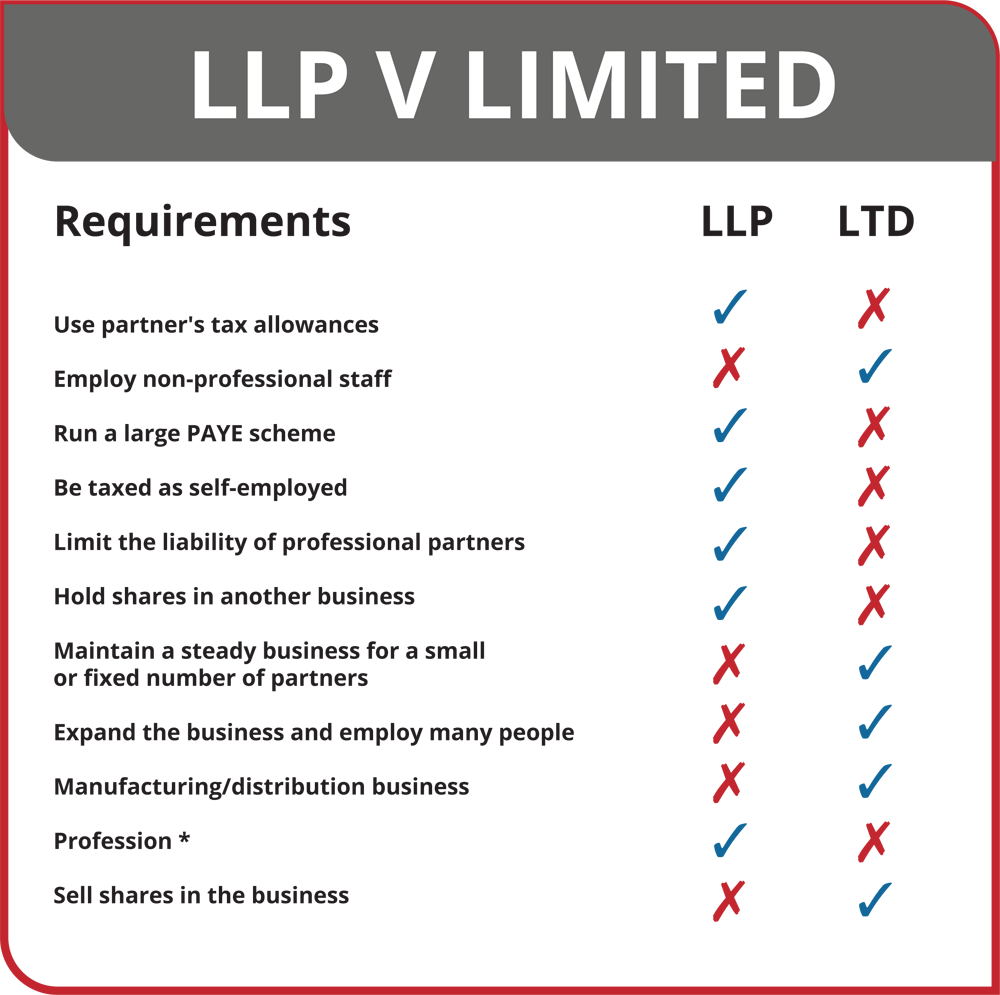

Limited Liability Partnership Explained

Our LLP Economy Package provides all company documents sent via email and Royal Mail
Our Economy LLP Company Formation Package is a popular package for new start-ups providing
all essential documents in electronic format, downloadable direct from our website usually within
a few minutes of registration, and printed documents sent via Royal Mail within 48 hours.
You can also choose a .co.uk domain name, with FREE hosting for 1 year, thereafter you decide if
you want to continue using our partners hosting service or transfer to your own host.
You can add some great optional features as you progress the order form; choice of alternative
registered offices, VAT registration, PAYE etc., or simply register as an Merit Package.

What’s included in our Economy LLP Package: £39.99
![]() Limited Liability Partnership Company Registration 1 to4 hours / All Government fees Paid
Limited Liability Partnership Company Registration 1 to4 hours / All Government fees Paid
![]() Incorporation Certificate sent via email (PDF) + Printed – sent via Royal Mai
Incorporation Certificate sent via email (PDF) + Printed – sent via Royal Mai
![]() Memorandum & Articles of Association sent via email (PDF) + Printed – sent via Royal Mail
Memorandum & Articles of Association sent via email (PDF) + Printed – sent via Royal Mail
![]() Unique Incorporation Document – Includes list of Designated Partners, Member Partners etc.
Unique Incorporation Document – Includes list of Designated Partners, Member Partners etc.
![]() Business Bank Account for Non-Profit Company
Business Bank Account for Non-Profit Company
![]() Domain Name (.com, .net, .co.uk etc)
Domain Name (.com, .net, .co.uk etc)
![]() 084 Business Number ready to use immediately FREE, NIL, ZERO running costs
084 Business Number ready to use immediately FREE, NIL, ZERO running costs
Limited Liability Partnership Explained
A new type of business structure became available as from April 6th. 2001 when the Limited Liability Partnerships Act 2000 came into effect. Various Limited Liability Partnerships Regulations supplement the provisions of the
Act.
A Limited Liability Partnership (LLP) is a registered legal entity imposing full limited liability on its members. Formation is completed using our software integrated directly with at Companies House. There must be at least two members, but there is no maximum limit. There should be at least two named ‘designated members’, who accept responsibility for filing information at Companies House, new partner registrations, update, etc.
An LLP is subject to a similar set of rules as a limited company as to annual registration of information at Companies House, including accounts and the company structure.
The Act does not impose a structure for the management of an LLP. There are no statutory provisions for general meetings, directors, company secretary, share allotments, etc. As with a common law partnership, these are matters for the LLP member agreement. There is no legal requirement to register (or even to have) a written LLP agreement, but such an agreement is essential in practice.
The LLP is treated for tax purposes as an ordinary partnership: i.e. each partner is liable to income tax for his or her share of the profits.



Frequently Asked Questions
1 What is a Limited Liability Partnership
2 What is the difference between an LLP and a limited company?
3 Members of LLP’s
4 Designated members of LLP’s
5 What is the difference between a member and a designated member?
6 Can anyone be a member of an LLP?
7 Are there any tax related benefits to an LLP?
8 Will the number of employees effect my choice of LLP or LTD?
9 Can I convert an existing partnership to an LLP?
10 The LLP regulations provide
11 Which is Best For You LLP or LTD?
FAQ’s Answered
1). What is a Limited Liability Partnership (LLP) ?
An LLP is a form of legal business entity with limited liability for the members. Company Formation Top
2. What is the difference between an LLP and a limited company?
The main difference is that an LLP has the organisational flexibility of a partnership and is taxed as a partnership. In other respects it is very similar to a private company. Company Formation Top
3). Members of LLP’s
The partners in an LLP are called members. The minimum number is two, there is no maximum number. The members may be individuals or companies. Company Formation Top
4). Designated members of LLP’s
The LLP must have at least two ‘designated members’, who are responsible for sending documents to Companies House for registration, etc. If Companies House is not notified of the identities of the designated members on registration, all the members are designated members.
The designated members may be changed from time to time by notification on the prescribed form. The Act itself does not specify the purpose of these designated members but the regulations that apply the provisions of the Companies Acts to LLP’s make the designated members the persons who are responsible for compliance with the various registration requirements, etc. Company Formation Top
5). What is the difference between a member and a designated member?
(featured on CH) With the agreement of the other members, a member may become a designated member at any time. Designated members have the same rights and duties towards the LLP as any other member. The LLP agreement and the general law govern these mutual rights and duties.
However, the law also places extra responsibilities on designated members. In particular, designated members are responsible for:
appointing an auditor (if one is needed)
signing the accounts on behalf of the members
delivering the accounts to Companies House
notifying Companies House of any membership changes or change to the registered office address or name of the LLP
preparing, signing and delivering the annual return to Companies House
acting on behalf of the LLP if it is wound up and dissolved
They are also accountable in law for failing to carry out these legal responsibilities.
6). Can anyone be a member of an LLP?
It is up to the members to decide who should be appointed to the LLP. The only restrictions are they must not:
have been disqualified from acting as a company director or member of an LLP (unless the court has given them permission to act for a particular LLP)
be an un-discharged bankrupt (unless the court has given them permission to act for a particular LLP).
7). Are there any tax related benefits to an LLP?
The key difference that affects the view of many start-up businesses is the tax treatment of the owners (members). In a traditional LTD the Directors (who are also usually the sole shareholders in a start-up company) are treated as employees of their own company. This means that their salary is subject to personal Income Tax and National Insurance and employers’ NI contributions. Profits left in the company (not withdrawn as salary) are subject to the (lower) Corporation Tax rate.
The members of an LLP pay Income Tax as self-employed persons, so there is no employers’ NI to pay. On the other hand, ALL the profits of the company are regarded as the members’ income and are subject to Income Tax.
So the balance of tax advantage depends on how much profit the company might make and how much the owners pay themselves.
8). Will the number of employees effect my choice of LLP or LTD?
If the company expects to employ people and the employee’s payroll is likely to be higher than the owners’ salary, a “private company limited by shares” may well be more tax efficient that a “limited liability partnership”
If the business is likely to remain as just two or three members who are each making a similar contribution and each draw similar salaries then the LLP option will probably be more tax efficient
It is wise to discuss the options with your tax accountant.
9). Can I convert an existing partnership to an LLP?
The simple answer is yes however, to convert an existing partnership to an LLP it will be necessary to follow a similar process as the conversion of a sole trader or partnership business to a limited company. The LLP will have to be registered and a date fixed for it to take over the existing business. There will have to be a transfer of every asset, liability, contract and business process of the firm from one entity to another.
It therefore requires firms to establish a clear understanding of their existing operations but LLPA 2000, s.12 provides that stamp duty is not chargeable on that transfer if the members of the LLP are the same as the original partners, and they hold the assets in the same proportions (or different proportions provided this is not to avoid liability to tax or stamp duty).
10). The LLP regulations provide:
Regulation 7: The mutual rights and duties of the members and the mutual rights and duties of the LLP and the members shall be determined, subject to the provisions of the general law and to any agreement express or implied between the members, or between them and the LLP, by the following rules:
1. All the members are entitled to share equally in the capital and profits of the LLP.
2. The LLP must indemnify every member in respect of payments made and personal liabilities incurred by him –
(a) in the ordinary and proper conduct of the business of the LLP; or
(b) in or about anything necessarily done for the preservation of the business or property of the LLP
3. Every member may take part in the management of the LLP.
4. No member shall be entitled to remuneration for acting in the business or management of the LLP.
5. No person may be introduced as a member or voluntarily assign an interest in an LLP without the consent of all existing members.
6. Any difference arising as to ordinary matters connected with the business of the LLP may be decided by a majority of the members, but no change may be made in the nature of the business of the LLP without the consent of all members.
7. The books and records of the LLP are to be made available for inspection at the registered office of the LLP (or at such other place as the members think fit) and every member of the LLP may when he thinks fit have access to and inspect and copy any of them.
8. Each member shall render true accounts and full information of all things affecting LLP to any member or his legal representative.
9. If a member, without the consent of the LLP, carries on any business of the same nature as and competing with the LLP, he must account for and pay over to the LLP all profits made by him in that business.
10. Every member must account to the LLP for any benefit derived by him without the consent of the LLP from any transaction concerning the LLP, or from any use by him of the LLP property, name or business connection.
Regulation 8. Expulsion
No majority of the members of an LLP can expel any member unless a power to do so has been conferred by express agreement between the members.
11). Which is Best For You LLP or LTD?

LLP V LIMITED
There is no absolute rule that makes one format better than the other. In any case, if your business changes over the years so that the alternative format becomes more appropriate, it is possible to form a new company of the other type – then transfer the business over to the new company.
Many professions allow and use the LTD format. Either is possible, but the LLP format was originally intended to meet the needs of the professions such as Solicitors, Accountants, Surveyors etc.
When making the decision to convert to an LLP, firms need to weigh up the medium to long term benefits against the short term costs of conversion. Apart from your legal costs, accounting costs and all the other marketing costs associated with the re-branding of the firm, your most significant “cost” is likely to be the internal time cost you invest in the project. All firms inevitably want to minimise the disruption to both clients and staff, and so it is vitally
important that the amount of internal time required to coordinate the conversion process must be taken into account in your project plan.
We have a large selection of prepared packages to choose from, select below for individual package features or click on the compare packages button to show at a glance what each package includes.

Other Essential Services
Coform have teamed up with many High Street and Online Banks, Internet Merchants Services, Telecommunication
Services and several other ‘service providers’ to help bring you a complete portfolio of business essentials, if you don’t
see what you are looking for on our website simply call our direct line and lets see if we can help.
Internet Merchant Services
We have
solutions for all types of businesses including high risk & adult sites.

084 FREE Business Numbers
Free 0844 No’s, + a large selection of 0161, 020, 0207, 0800 and 03 numbers all from £4.97 pm

Registered Offices
Registered Offices in London, Manchester, N. Ireland and Scotland, from as little as £49 per year.

Poor Credit Bank Accounts
High street and Online Business Account Approval for Poor Credit Issues
